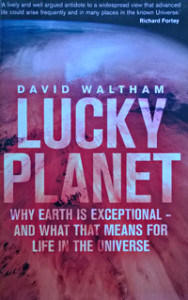Lucky Planet
Why Earth is Exceptional – and what that means for life in the Universe
by David Waltham. Published by Icon Books www.iconbooks.net
‘Four billion years of good weather’ sums up David Waltham’s argument for the uniqueness of planet Earth. Of course, by ‘good weather’ he doesn’t necessarily mean the sort of pleasant afternoon that would see you dusting off the barbecue tongs. Good weather by planetary standards means that the Earth’s average temperature has not dipped below about –50 degrees or soared above +50 degrees centigrade in the 3.5 billion years since life began. Considering that the Earth’s atmosphere, orbit and amount of heat received from the Sun have varied considerably over the same period, it is, Waltham argues, only a remarkable series of coincidences that have allowed these influences to effectively balance each other out. Coincidences so unusal that we are almost certainly the only intelligent life in the galaxy and possibly in the observable universe.
Waltham’s forte is geology (he is currently head of Earth Sciences at Royal Holloway, University of London) so a lot of the book concerns deep time; geology, chemistry and early life over billion of years but with only one current example for planetary life Waltham leans heavily on the Anthropic Principle and observer bias – i.e. if conditions for life weren’t exactly as they are there would be no observers.
For example: many, including Carl Sagan, have argued that since life began pretty much immediately after Earth’s surface cooled enough to allow liquid water, it must be relatively easy to get going. But by the same argument, intelligent life must be a pretty difficult trick since it’s taken so long to get to us (scale the lifetime of the Earth to the average 80 year lifetime of a human and Earth has just turned 70). Waltham argues that this is just another observer bias. Worlds that don’t throw that double six for the first ‘origin of life’ move simply don’t have time to develop intelligent observers. Our Sun is gradually getting warmer and in half a billion years even a zero level of Carbon Dioxide will not be enough to stop the planet baking. A more leisurely life inception would mean intelligence wouldn’t have time to show up before plant life went extinct and the oceans boiled away.
A keen amateur astronomer from his youth, Waltham doesn’t ignore astronomical conditions either. He spends a lot of time on Earth’s place in the solar system, chance orbital resonances and the double-edged sword of a large moon (suggesting these celestial coincidences, over which life has no sway, argue against the Gaia hypothesis). Since all habitable planets need the same lunar conditions, an interesting side effect would be that any aliens that do exist experience solar eclipses!
He also spares a chapter for cosmology – you can’t have a lucky planet without a lucky Universe. He touches briefly on the main cosmological theories and the evidence (where such exists) supporting each. He spends some time on the ‘Horizon Problem’ – why the Universe is almost the same temperature in all directions and the coincidence of what variations there are being just the right size to seed galaxies.
(Let me take a moment here. I’ve never understood why this was a problem and maybe some kindly cosmologist can help me out: If I make a cup of tea in Dublin and Dubai, they will be in thermal equilibrium not because they’ve exchanged energy but because they were created by the same process. Similarly, if the same creation event is responsible for this bit of spacetime over here as that bit over there, isn’t having the same thermal – and other – properties what you would expect?) .
Astronomers suggest there may be a billion Earth-like worlds in the galaxy but Waltham’s cogent argument maintains the odds against intelligent life are much longer than that and we’ve just been lucky so far. If we want to find intelligent life among the stars, let’s hope we stay lucky long enough to put it there ourselves.
